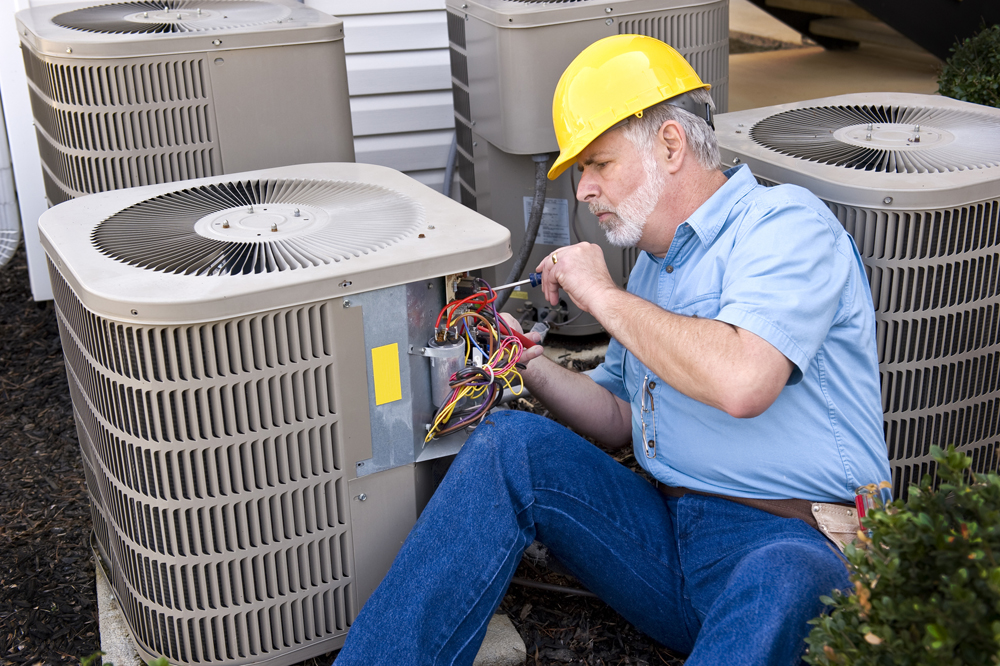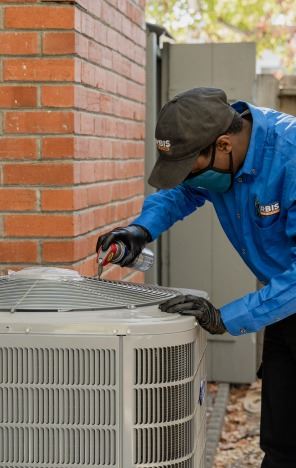Top Reasons to Schedule heat pump replacement ooltewah tn
Top Reasons to Schedule heat pump replacement ooltewah tn
Blog Article
Choosing Between a Heatpump and Heater: Key Considerations for Your HVAC Needs
When examining home heating alternatives for HVAC needs, the decision between a heatpump and a heating system can be complicated. Each system uses distinctive benefits customized to details environments and energy efficiency goals. Understanding these distinctions is necessary for making an enlightened selection. Secret aspects such as installation expenses and ecological effect additionally complicate the choice process. Which option absolutely straightens with one's convenience and sustainability preferences? The adhering to sections will explore these factors to consider in detail.
Recognizing Warmth Pumps: Just How They Function and Their Benefits
While many homeowners think about various heating alternatives, recognizing just how warm pumps function and their advantages can greatly affect their choice. Heatpump operate by transferring warm as opposed to producing it. In the winter, they remove warm from the outdoors air or ground and transfer it inside, while in the summer season, they reverse this process, cooling down the home by getting rid of warm outside. This twin performance makes them functional for year-round climate control.One of the main advantages of warmth pumps is their energy effectiveness. They use substantially less electricity contrasted to traditional heating unit, possibly causing lower energy costs (ductless mini splits). In addition, heatpump have a smaller sized carbon impact, making them an eco-friendly selection. They likewise call for much less upkeep than traditional systems, adding to lasting cost savings. Generally, recognizing the technicians and benefits of heatpump can help property owners make educated decisions concerning their home heating and cooling down demands
Discovering Furnaces: Kinds, Operation, and Advantages
Heaters are available in numerous kinds, including gas, electric, and oil models, each with distinctive operational systems. Comprehending these differences is necessary, as they affect performance and home heating efficiency. Furthermore, heating systems supply countless advantages, such as consistent heat output and reliability in colder climates.
Types of Heating systems
Heating unit can vary significantly in style and operation, with furnaces being a popular choice amongst home owners. There are a number of kinds of heaters, each using different fuel resources and modern technologies. Gas heaters are typical, leveraging gas to produce warmth effectively. Electric heating systems, on the other hand, make use of electric resistance to generate heat, usually preferred for their simple installation. Oil heaters, while much less typical, work in locations with limited gas accessibility (heat pump installation ooltewah tn). In addition, condensing heating systems optimize energy performance by reusing and recording exhaust gases. Each type runs through a system of warmth exchangers and ductwork to distribute cozy air throughout a home. Understanding the differences between these heater types is important for educated a/c choices
Advantages of Heating systems
For homeowners seeking reliable warmth throughout cold months, the advantages of heaters are significant. Heating systems give constant home heating, making certain even temperatures throughout the home. They are especially reliable in extreme cold, typically surpassing heatpump in icy problems. Various types, consisting of gas, electrical, and oil furnaces, use adaptability to meet diverse needs and preferences.Furnaces likewise have a tendency to have reduced first installment prices contrasted to heatpump, making them a more obtainable alternative for several. Their durable layout adds to a much longer life-span, with several devices lasting over 15 years with correct upkeep. In addition, modern heaters are usually geared up with advanced technology for improved efficiency, which can lead to decreased energy expenses. Generally, heating systems continue to be a dependable choice for reliable home heating.

Energy Efficiency: Contrasting Heat Pumps and Furnaces
When comparing energy effectiveness between heatpump and heating systems, the Seasonal Energy Effectiveness Ratio (SEER) plays an essential role in identifying performance. Additionally, an operational cost evaluation exposes the long-term financial implications of each system. Understanding these factors can guide homeowners in making informed choices regarding their home heating options.
Seasonal Energy Efficiency Proportion
Power effectiveness plays a vital function in the decision-making procedure in between warm pumps and heating systems, particularly when considering the Seasonal Energy Efficiency Ratio (SEER) This statistics measures the cooling effectiveness of warmth pumps over an entire cooling season, giving a standardized way to examine performance. Higher SEER ratings show higher power performance, converting to reduced power intake and minimized energy expenses. In comparison, heating systems are typically assessed using the Annual Fuel Use Performance (AFUE) rating, which reflects home heating effectiveness. When comparing these 2 systems, homeowners should focus on SEER ratings for heat pumps, as they straight impact general energy cost savings and environmental sustainability. A comprehensive understanding of SEER can especially influence the long-lasting complete satisfaction and cost-effectiveness of the picked a/c service.
Operational Price Analysis
Comprehending the operational prices related to heatpump and heaters is important for property owners evaluating their options. Warm pumps usually supply higher energy performance, transforming electric energy into warmth with marginal waste. This causes reduced monthly energy expenses, particularly in modest climates. Conversely, conventional furnaces, particularly gas models, may have reduced in advance expenses yet can incur greater functional costs with time as a result of sustain costs and efficiency ratings.Moreover, warm pumps can work as both heating and cooling down systems, possibly lowering the demand for separate HVAC devices. While preliminary financial investments for heatpump may be greater, their long-lasting savings in energy efficiency can make them an extra cost-effective option for numerous homes. Careful analysis of local power rates is vital to determine the very best option.
Installment Costs: What to Anticipate for every Heating Unit
Installation prices for heating systems can differ considerably in between heatpump and heaters, affecting house owners' decisions. Heatpump normally have higher upfront setup prices, commonly ranging from $3,500 to $8,000, relying on the unit dimension and intricacy of setup. This consists of the outdoor device, indoor handling system, and needed ductwork modifications. Alternatively, furnaces have a tendency to have reduced initial expenses, balancing between $2,500 and $6,000, which can be appealing for budget-conscious house owners. However, setup expenditures can enhance if extensive ductwork is required.Moreover, the selection of fuel type for heaters-- natural gas, lp, or electrical-- can likewise impact setup prices. While heatpump offer power efficiency, their first investment may prevent some customers. Inevitably, examining installment prices along with lasting financial savings and performance will certainly aid home owners in making educated choices regarding their heater.
Climate Considerations: Which System Carries Out Better in Your Location
Just how do environment conditions influence the performance of heating unit? The efficiency of warm pumps and heating systems can vary significantly depending upon the regional climate. In moderate climates, heatpump stand out by successfully transferring heat from the outdoors air, making them an energy-saving choice. Nevertheless, their efficiency diminishes in exceptionally cool temperature levels, where they may have a hard time to draw out adequate heat. Alternatively, heating systems, especially gas models, give constant and dependable warmth despite exterior conditions, making them better in chillier regions.In locations that experience milder winters, heatpump can operate successfully year-round, providing both cooling and heating. In comparison, areas with severe winters months typically take advantage of the robustness of heating systems. Inevitably, comprehending the neighborhood climate is vital when determining furnace replacement between a warm pump and a heater, as it directly impacts their functional efficiency and overall performance.
Upkeep Needs: Long-Term Take Care Of Heat Pumps vs. Furnaces
While both heatpump and heaters call for routine maintenance to assure peak efficiency, their particular needs and treatment routines vary substantially. Heaters commonly require less frequent focus, with yearly inspections being sufficient to look for gas leaks, clean filters, and examine general performance. Their simpler layout usually enables for straightforward repairs.In comparison, heat pumps necessitate semiannual maintenance as a result of their double function in heating and cooling. This consists of cleaning coils, examining refrigerant degrees, and making sure that both the outdoor and indoor devices work at their ideal. Additionally, heatpump maintenance usually includes even more elaborate parts, making expert maintenance essential.Neglecting maintenance can cause lessened efficiency and boosted power costs for both systems. Eventually, homeowners must take into consideration these long-term care demands when picking between a warm pump and a heater, as aggressive maintenance can prolong the life expectancy and efficiency of either system considerably.
Environmental Effect: Picking a Sustainable Heating Choice
The environmental effect of heater is a crucial evaluation for house owners seeking sustainable options. Heatpump are normally extra energy-efficient than typical furnaces, as they move warmth instead than create it, greatly reducing carbon emissions. By utilizing renewable resource resources, such as air-source or geothermal heatpump, homeowners can further reduce their ecological footprint.On the other hand, all-natural gas heaters send out greenhouse gases and add to air contamination, though they typically provide greater heat result. However, innovations in technology have resulted in the development of high-efficiency furnaces that minimize emissions.Ultimately, picking a heating unit entails considering effectiveness against environmental influence. Property owners are urged to assess local power sources and rewards for eco-friendly systems, making sure a choice that straightens with both personal comfort and ecological responsibility. The decision influences not only instant click this link convenience but likewise lasting sustainability and environmental health and wellness.
Frequently Asked Concerns
Exactly How Lengthy Do Heat Pumps and Furnaces Generally Last?
The lifespan of warmth pumps normally ranges from 15 to two decades, while heating systems can last between 15 to thirty years. Normal maintenance significantly affects their long life and efficiency in giving heating solutions.
Can I Make Use Of a Warm Pump in Extremely Cold Climates?
Heatpump can run in exceptionally cold climates, but their effectiveness reduces as temperature levels drop. In such conditions, extra home heating resources might be essential to keep comfy interior temperature levels and assure peak efficiency.

What Is the Noise Level of Warm Pumps Versus Furnaces?
The sound degrees of heatpump and furnaces differ significantly. Usually, heatpump run even more quietly than traditional heating systems, making them better for those conscious sound, while heating systems may create louder functional sounds throughout home heating cycles.
Are Warmth Pumps Suitable for Both Home Heating and Air conditioning?
Warmth pumps are indeed ideal for both heating and cooling (heat pump service). They function by transferring heat, offering efficient temperature control year-round, making them a versatile selection for homeowners looking for an all-in-one cooling and heating remedy
What Size Heating Unit Do I Required for My Home?
Figuring out the proper size heating unit for a home calls for examining aspects such as square footage, insulation quality, neighborhood climate, and the home's layout. Consulting a specialist can ensure an accurate analysis and suitable comfort. Heat pumps commonly use higher power effectiveness, converting electrical energy into warm with minimal waste. In modest environments, warm pumps excel by efficiently moving warm from the outdoors air, making them an energy-saving choice. Conversely, furnaces, specifically gas designs, supply consistent and dependable heat regardless of outdoor conditions, making them better in chillier regions.In locations that experience milder winters, warm pumps can run efficiently year-round, giving both heating and cooling. Warmth pumps are generally a lot more energy-efficient than typical furnaces, as they move warmth instead than generate it, significantly minimizing carbon emissions. By utilizing eco-friendly energy sources, such as geothermal or air-source warm click this link pumps, home owners can even more minimize their eco-friendly footprint.On the various other hand, all-natural gas furnaces discharge greenhouse gases and contribute to air contamination, though they frequently offer higher warm outcome.
Report this page